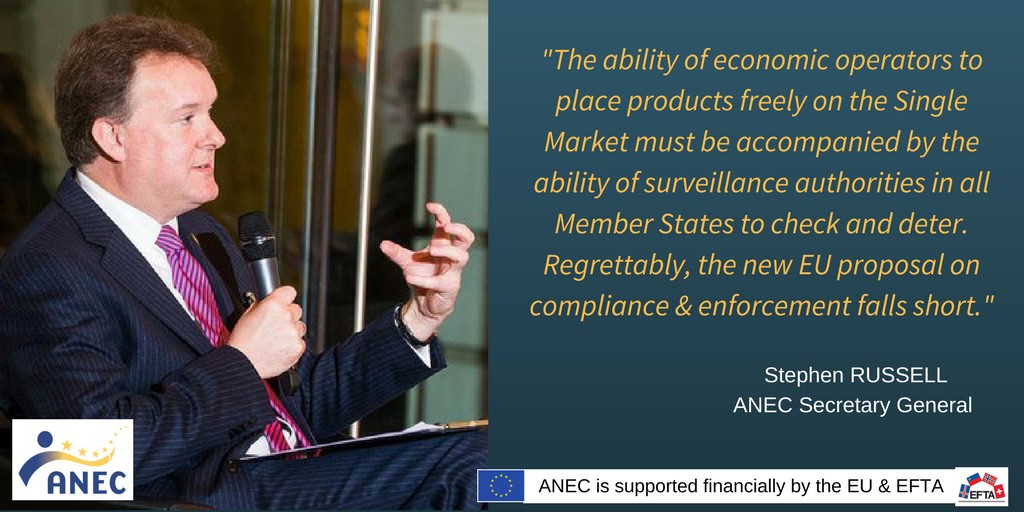Horizontal
The Goods Package - is the EU on the right track?
ANEC Secretary-General, Stephen Russell, spoke in the the EPC Policy Dialogue ‘The goods package – is the EU on the right track?’ on 8 February.
In December 2017, the European Commission (EC) published two legislative proposals in support of its Single Market Strategy which ANEC welcomed with BEUC. Mr Russell joined the consensus of the expert panel in acknowledging the EC proposal on compliance and enforcement is a step in the right direction, even if it lacks ambition and reflects “only the art of the possible”.
Mr Russell was critical of Member States, noting that despite EU Regulation 765/2008/EC (setting out the requirements for accreditation and the market surveillance of products), resources for market surveillance and enforcement have halved in many countries during the past decade. He ended by asking whether, in support of the European frameworks for legislation & technical standardisation, the continued fragmentation and poor resourcing of surveillance and enforcement authorities meant that Member States should no longer be trusted to deliver this third pillar of compliance and enforcement under subsidiarity.

Digital Society
#CybersecurityAct
ANEC Deputy Secretary-General, Chiara Giovannini (ably supported by Cayla, the “spying doll”) gave the consumer perspective on cybersecurity certification and standardisation at an event hosted by CEN- CENELEC, ETSI and ENISA on 13 February.
ANEC believes the vulnerability of connected devices can have an adverse impact on consumers and society at large. According to the EC’s latest Eurobarometer, 86% of consumers believe the risk from cyberattack is increasing. We therefore welcome the Cybersecurity Act, and strengthened role of ENISA in cybersecurity. However, we doubt the proposed cybersecurity certification framework will be effective due to its voluntary nature and complicated governance structure.
To ensure a high-level of security by design and by default, ANEC believes a minimum set of requirements for security should be binding for all connected products as a condition for placing them on the market. Such a framework should complement existing and pending legislations that require cybersecurity measures, such as the General Data Protection Regulation and proposed European Cybersecurity Act.

Horizontal
Harmonised Standards Consultants
The present New Approach Consultants (NAC) will become HAS Consultants (Harmonised Standards) from 1 April. The EC presented the new framework for the HAS Consultants on 26 February. The aim is to improve the quality and the timely availability of safety standards for products in the Single Market. It is linked to an implementing action of the Joint Initiative on Standardisation (JIS), to which ANEC is one of numerous signatories. The HAS Consultants will now represent the view of the EC on whether a standard meets the legal requirements to which it is intended to provide presumption of conformity.
Presentations at the event can be found at this link, and the recording is available on this web page.
ANEC welcomes that the HAS Consultants will reporting to the EC and not hired by CEN-CENELEC as in the past. For many years, we have been calling for a stable solution to safeguard and strengthen the independence of the Consultants.
A call for expression of interest from potential HAS Consultants is open from 18 February to 11 March 2018. Following a call for tender, the HAS Consultants call will be managed by the EY consultancy. More information can be found on the EY website.
Domestic Appliances
Electrical product safety
Following the several fatalities that arose from numerous white goods fires, the UK’s Home Electrical Safety All-Party Parliamentary Group (APPG) launched a consultation in January on product recall and electrical product safety in the UK. The consultation ran until 23 February. ANEC sent a contribution to stress wider European concerns.
Concerning product recall, we argued for market surveillance to be strengthened as it is fragmented, inadequate and poorly resourced. Given the shortage of resources, it is of utmost importance for authorities to have a tool at their disposal to set priorities for enforcement. We therefore reiterated the 2013 call from a coalition of over 40 European associations from across the economic & social spectrum for the creation of a Pan-European Accident & Injury Data System. The success of any recall is dependent upon the communication of information to consumers. Hence, we called for early and wide diffusion of information to consumers on dangerous products. Finally, penalties must be used to finance market surveillance activities and be an effective deterrent against non-compliances.
Concerning general electrical product safety, we highlighted that connected products and the “Internet of Things” (IoT), as well as products sold online, present national authorities with an enormous challenge. We recommended the concept of ‘safety’ in general and sector specific product safety legislation be broadened to reflect cybersecurity, data security and product safety concerns. We further stressed the importance of raising awareness and informing consumers as most consumers believe products bought online are safe. Consumer complaints are also a valuable source of information about non-compliant products sold online. Finally, we called on authorities to increase their engagement in the standardisation process. It is not sufficient to fall back on use of the “Formal Objection” procedure in the case where an adopted standard is clearly inadequate in the view of one or more Member States.
We expressed views on the issue of introducing a consumer-orientated marking or logo for identifying fridge freezers fitted with a flame retardant back, safety tested to an agreed standard. ANEC noted warnings and labels are increasingly used as substitutes for the safe design of a product thus moving the burden of protection on to the consumer. Warnings and labels must be only complementary to safety measures and not preclude the manufacturer from the obligation to ensure that products do not present an avoidable risk or hazard to consumers.
We also called on the UK government to ensure its citizens and consumers enjoy the same levels of safety and protection as all other EU consumers after Brexit. Regardless of whether the UK remains part of the European Standardisation System, given the paucity of resources for market surveillance and enforcement both in the UK and in (other) EU Member States, we believe it can only make sense for the UK to continue to participate in common market surveillance actions with other Member States, at least while the EU remains the UK’s biggest trading partner.
Digital Society
Simply smart!
 On 21 February, ANEC Deputy Secretary-General, Chiara Giovannini, spoke in the European Committee of Domestic Equipment Manufacturers (CECED) workshop ‘Challenges and Opportunities of Smart Appliances in the Home’.
On 21 February, ANEC Deputy Secretary-General, Chiara Giovannini, spoke in the European Committee of Domestic Equipment Manufacturers (CECED) workshop ‘Challenges and Opportunities of Smart Appliances in the Home’.
She stressed that smart appliances can bring social and economic benefits to consumers, but the potential opportunities will be achieved only if services and products can be designed with trust, privacy and security built in so that consumers feel that they are fair and safe to use. Security by design and default needs to become a priority for manufacturers. She noted that our members have tested several connected products available on the market, and unfortunately, the present situation in terms of legislation and standardisation in Europe falls short in meeting consumer expectations.
Chiara concluded by highlighting that, in addition to new legislation, granular tools are necessary to deal with new risks and challenges, and that standards can be a formidable tool for embedding values, such as security and privacy, in product design. Hence it is the right balance of legal requirements, standardisation and market surveillance that can deliver consumer protection.
Sustainability
ANEC on cabin air quality on commercial aircrafts
CEN/TC 436 ‘Cabin Air Quality on commercial aircraft – Chemical Agents' has agreed on the development of a list of compounds to enable the identification of potential sources of airborne contaminants onboard of commercial aircrafts for which measurement technology exists that can reliably detect relevant concentrations. This has led to further discussions on the derivation and evaluation of ‘trigger points’.
Further to our contribution to the work of the TC, we have published a position paper on cabin air quality on commercial aircrafts – Expectations about use of the list of chemical marker compounds.
The approach adopted by TC 436 is a reflection of the standard ASHRAE 161 ‘Air Quality within Commercial Aircraft’, developed by the American Society of Heating, Refrigerating and Air-Conditioning Engineers (ASHRAE). We find this to be a valid approach, but much more detail is needed about the choice of substances to be included, the determination of trigger levels and the resulting pilot or maintenance actions.
We call for the future European Standard to provide further guidance on these aspects, especially in relation to trigger levels. We recommend to determine several levels of trigger point, from low levels that are below conservative health thresholds, to higher levels where the safety of the aircraft is at risk and requires immediate intervention. A pragmatic approach for determining trigger points for online monitoring is needed.
Our position paper will be revised after the next CEN/TC 436 meeting in March 2018. Further to this, ANEC will approach the EC and European Aviation Safety Agency (EASA) to present our recommendations.
Traffic & Mobility
Review of the vehicle safety and pedestrian safety regulations
ANEC is among a coalition of industry, NGOs, consumer groups and cities calling on the European Parliament (EP) for swift adoption of ambitious vehicle and pedestrian safety standards.
The EC is expected to make a proposal for revision of the General Safety (661/2009/EC) and Pedestrian Safety (661/2009/EC) Regulations on 2 May as part of the Third Mobility Package. In the context of the next EP elections, we urge that the EP does its utmost to deliver a strong and timely position on these critical regulations for road safety.
EU vehicle safety standards were last revised almost a decade ago. With 70 deaths every day on European roads, more ambitious safety regulations are needed without delay.
Child Safety
ANEC co-sponsoring national training in Serbia
ANEC will join the “International Expert Meeting - Outdoor Play”, being hosted by the Serbian Association of Landscape Architects on 21-22 March in Belgrade.
The meeting will focus on playgrounds, their design and safety. Zoran Nikolic of the National Consumer Organization of Serbia and Serbian member of the General Assembly, will participate together with Helena Menezes, from the ANEC Child Safety WG. Helena, who represents ANEC in CEN/TC 136/SC 1 dealing with standards for playground safety, will also moderate a session on how standards can affect design, and the adaptation of existing playgrounds to new standards.
Other
New CEO of ICRT
Mr Niels Ebbe Jacobsen joined International Consumer Research & Testing (ICRT) as Chief Executive Officer on 1 March. His term overlaps with that of the present CEO, Guido Adriaenssens, who retires at the end of June.
ANEC congratulates Mr Jacobsen on his appointment and looks forward to working with him, notably in the context of the ANEC-BEUC-CI-ICRT Memorandum of Understanding.
News from ANEC Members
DENMARK
Unwanted chemicals found in dark chocolate
The results of a recently published test by the Danish Consumer Council THINK Chemicalsl THINK Chemicals found that all of the chocolates tested from twelve major brands contained unwanted substances.
One of the substances found, perhaps the most worrying, was cadmium. All chocolates tested contained this heavy metal. Eating a single bar of the chocolate found to contain the highest levels of cadmium would equal the maximum recommended intake of cadmium for 4 days. This is well above the future EU limit for cadmium in dark chocolate. Exceeding this limit does not pose an acute risk but could be a long-term risk. This heavy metal, like many others, can accumulate in the liver and kidneys. In the long-term, this accumulation may cause liver and kidney damage.
For more, please visit the Danish Consumer Council THINK Chemicals website.
List of comments 2018 |
List of meetings 2018 |
For comments or if you wish to write an article for the ANEC Newsletter, please contact: Kristina Aleksandrova (This email address is being protected from spambots. You need JavaScript enabled to view it.).


